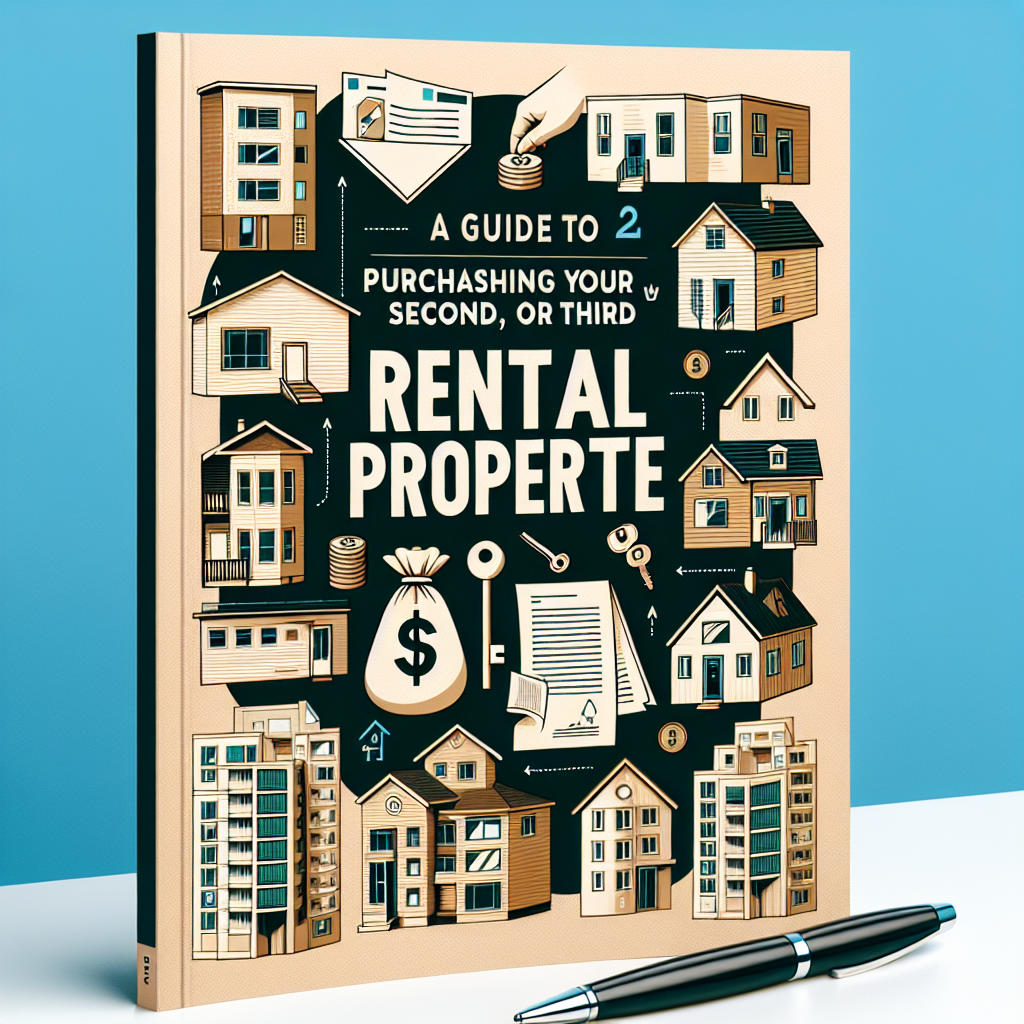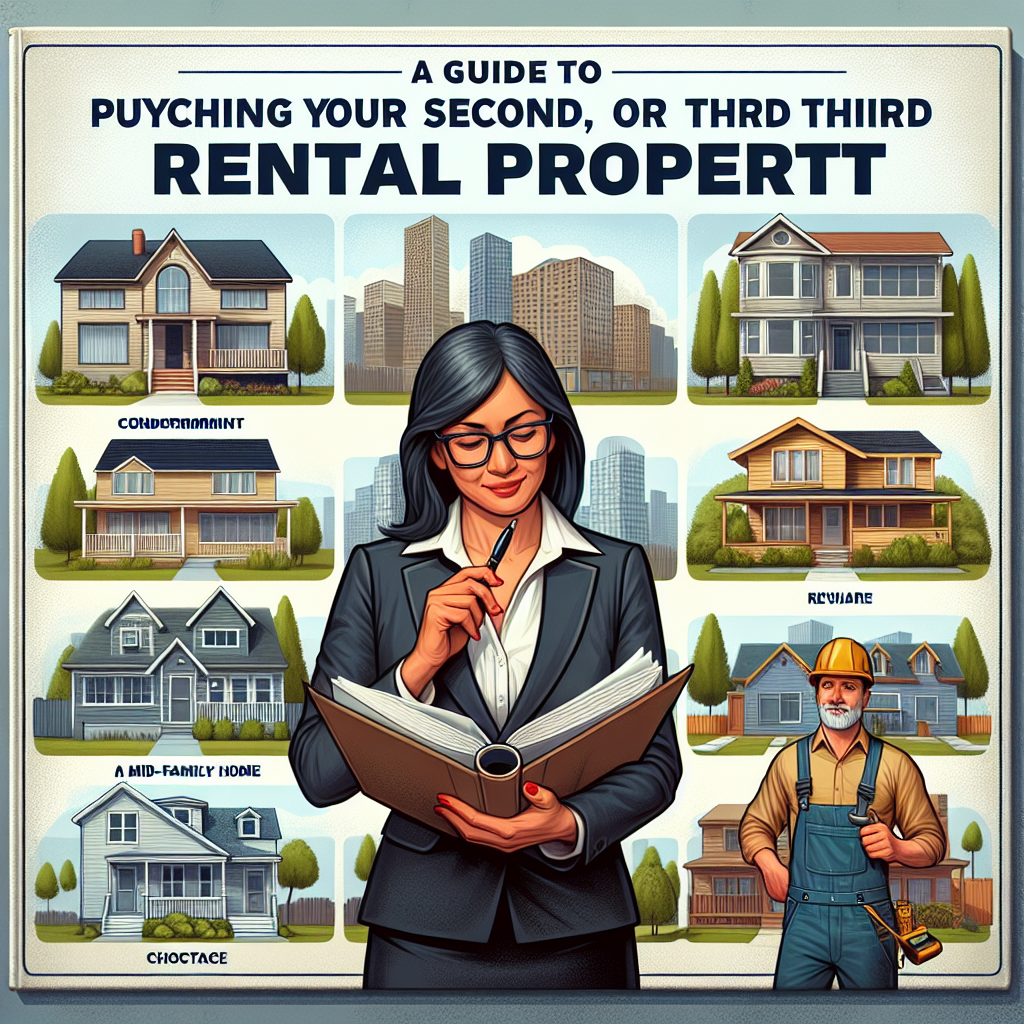-
Table of Contents
- A Guide to Purchasing Your First, Second, or Third Rental Property
- Understanding the Rental Property Market
- Market Research
- Case Study: The Impact of Location
- Financing Your Rental Property
- Mortgage Options
- Calculating ROI
- Finding the Right Property
- Property Types
- Evaluating Properties
- Case Study: Single-Family vs. Multi-Family
- Managing Your Rental Property
- Self-Management
- Professional Property Management
- Case Study: The Benefits of Professional Management
- Legal Considerations
- Landlord-Tenant Laws
- Insurance
- Case Study: The Importance of Legal Compliance
- Scaling Your Rental Property Portfolio
- Strategies for Growth
- Case Study: Scaling Successfully
- Conclusion
A Guide to Purchasing Your First, Second, or Third Rental Property

Investing in rental properties can be a lucrative way to build wealth and secure financial stability. Whether you’re buying your first, second, or third rental property, the process can be complex and requires careful planning and research. This guide will walk you through the essential steps and considerations to ensure a successful investment.
Understanding the Rental Property Market
Before diving into the purchase of a rental property, it’s crucial to understand the current market conditions. The real estate market can vary significantly from one location to another, and even small changes in the economy can impact property values and rental demand.
Market Research
Conducting thorough market research is the first step in making an informed investment decision. Here are some key factors to consider:
- Location: The location of the property is one of the most critical factors. Look for areas with strong job growth, good schools, and low crime rates.
- Rental Demand: Investigate the demand for rental properties in the area. High demand can lead to higher rental income and lower vacancy rates.
- Property Values: Analyze recent sales data to understand property values and trends in the area.
- Economic Indicators: Pay attention to local economic indicators such as employment rates, population growth, and infrastructure development.
Case Study: The Impact of Location
Consider the case of John, who purchased his first rental property in a suburban area with excellent schools and a growing job market. Within a year, he saw a significant increase in property value and had no trouble finding tenants. In contrast, his friend Sarah bought a property in a declining neighborhood and struggled with high vacancy rates and lower rental income.
Financing Your Rental Property
Securing financing is a critical step in purchasing a rental property. There are several financing options available, each with its pros and cons.
Mortgage Options
Here are some common mortgage options for rental properties:
- Conventional Loans: These are traditional loans offered by banks and mortgage lenders. They typically require a higher down payment (20-25%) and have stricter credit requirements.
- FHA Loans: Federal Housing Administration (FHA) loans are available for first-time homebuyers and require a lower down payment (as low as 3.5%). However, they come with additional insurance costs.
- VA Loans: Veterans Affairs (VA) loans are available to veterans and active-duty military personnel. They offer competitive interest rates and require no down payment.
- Portfolio Loans: These are loans held by the lender rather than being sold on the secondary market. They offer more flexibility but may come with higher interest rates.
Calculating ROI
Before committing to a property, it’s essential to calculate the potential return on investment (ROI). Consider the following factors:
- Purchase Price: The initial cost of the property.
- Rental Income: The monthly rent you can expect to receive.
- Operating Expenses: Costs such as property management fees, maintenance, insurance, and property taxes.
- Financing Costs: Mortgage payments, interest rates, and loan fees.
Use these figures to calculate your net operating income (NOI) and cash flow. A positive cash flow indicates a potentially profitable investment.
Finding the Right Property
Once you have a clear understanding of the market and your financing options, it’s time to find the right property. This step involves several key considerations.
Property Types
There are various types of rental properties to choose from, each with its advantages and disadvantages:
- Single-Family Homes: These are standalone properties that are typically easier to manage but may offer lower rental income compared to multi-family units.
- Multi-Family Homes: Properties with multiple units (duplexes, triplexes, etc.) can provide higher rental income but may require more management and maintenance.
- Condos and Townhomes: These properties often come with lower maintenance responsibilities but may have higher association fees.
- Commercial Properties: These include office buildings, retail spaces, and industrial properties. They can offer high returns but come with increased risk and complexity.
Evaluating Properties
When evaluating potential properties, consider the following factors:
- Condition: Assess the property’s condition and any necessary repairs or renovations. A property in good condition will require less upfront investment.
- Location: As mentioned earlier, location is crucial. Ensure the property is in a desirable area with strong rental demand.
- Rental Income Potential: Research comparable rental properties in the area to estimate potential rental income.
- Future Appreciation: Consider the potential for property value appreciation over time.
Case Study: Single-Family vs. Multi-Family
Jane was deciding between a single-family home and a duplex for her second rental property. After evaluating the rental income potential and management requirements, she chose the duplex. The higher rental income from two units outweighed the additional management responsibilities, leading to a better overall ROI.
Managing Your Rental Property
Effective property management is essential for maximizing your rental income and maintaining the property’s value. You can choose to manage the property yourself or hire a professional property management company.
Self-Management
If you decide to manage the property yourself, be prepared to handle the following tasks:
- Tenant Screening: Conduct thorough background checks to find reliable tenants.
- Rent Collection: Ensure timely rent collection and handle any late payments or disputes.
- Maintenance and Repairs: Address maintenance issues promptly to keep the property in good condition.
- Legal Compliance: Stay informed about local landlord-tenant laws and regulations.
Professional Property Management
Hiring a property management company can save you time and effort. These companies handle all aspects of property management, including tenant screening, rent collection, maintenance, and legal compliance. However, they charge a fee (typically 8-12% of the monthly rent).
Case Study: The Benefits of Professional Management
Mark owned three rental properties and found it challenging to manage them all while working a full-time job. He decided to hire a property management company, which significantly reduced his workload and improved tenant satisfaction. The increased efficiency and reduced stress were well worth the management fee.
Legal Considerations
Owning rental properties comes with various legal responsibilities. It’s essential to understand and comply with all relevant laws and regulations to avoid legal issues.
Landlord-Tenant Laws
Familiarize yourself with local landlord-tenant laws, which govern issues such as:
- Security Deposits: Rules regarding the collection, handling, and return of security deposits.
- Lease Agreements: Requirements for lease agreements, including necessary disclosures and terms.
- Evictions: Legal procedures for evicting tenants for non-payment or lease violations.
- Maintenance and Repairs: Landlord responsibilities for maintaining the property and addressing repairs.
Insurance
Ensure you have adequate insurance coverage for your rental property. This includes:
- Property Insurance: Covers damage to the property from events such as fire, storms, and vandalism.
- Liability Insurance: Protects you from legal claims if someone is injured on your property.
- Loss of Rental Income Insurance: Covers lost rental income if the property becomes uninhabitable due to a covered event.
Case Study: The Importance of Legal Compliance
Lisa failed to comply with local landlord-tenant laws regarding security deposits. A tenant sued her for improperly withholding the deposit, resulting in a costly legal battle. This experience highlighted the importance of understanding and following all legal requirements.
Scaling Your Rental Property Portfolio
As you gain experience and confidence, you may want to expand your rental property portfolio. Scaling your investments can increase your income and diversify your risk.
Strategies for Growth
Consider the following strategies for scaling your rental property portfolio:
- Leverage Equity: Use the equity in your existing properties to finance new purchases.
- Partner with Investors: Form partnerships with other investors to pool resources and share risks.
- Explore Different Markets: Diversify your portfolio by investing in different geographic locations.
- Invest in Multi-Family Properties: Multi-family properties can provide higher rental income and economies of scale.
Case Study: Scaling Successfully
Tom started with a single rental property and gradually expanded his portfolio by leveraging equity and partnering with other investors. Within five years, he owned ten properties in different markets, providing a steady and diversified income stream.
Conclusion
Purchasing your first, second, or third rental property can be a rewarding investment if done correctly. By understanding the market, securing the right financing, finding the right property, managing it effectively, and complying with legal requirements, you can build a successful rental property portfolio. Remember to conduct thorough research, calculate your ROI, and consider professional management if needed. With careful planning and execution, rental properties can provide a reliable source of income and long-term financial security.
Whether you’re a novice investor or an experienced landlord, this guide offers valuable insights to help you navigate the complexities of rental property investment. By following these steps and learning from real-life examples, you can make informed decisions and achieve your investment goals.








